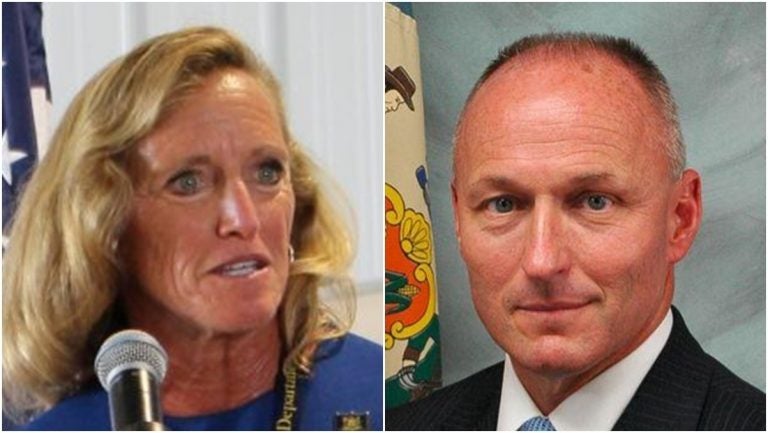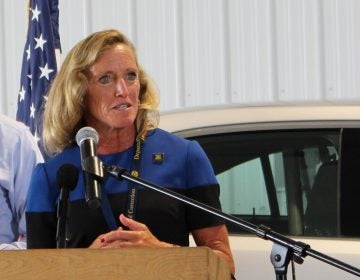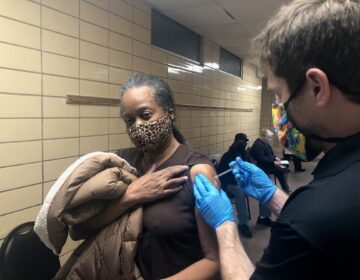Delaware’s first female prisons chief leaving to oversee spending of $2 billion in COVID-19 stimulus money
Claire DeMatteis is moving to a new job after guiding the Department of Correction through a tumultuous four-plus years, since a prison riot left a guard dead.

Claire DeMatteis is leaving her post as Delaware corrections commissioner. Monroe B. Hudson Jr. has been nominated to succeed her. (State of Delaware)
The last four-plus years have been tumultuous for Delaware’s correctional system, ever since a riot at the state’s largest prison in February 2017 left one guard dead and exposed a host of security and operational deficiencies.
While trying to identify problems and implement reforms since then, the department has continued to grapple with the chronic difficulty of hiring guards and retaining them. And over the last 15 months, officials have had to deal with coronavirus outbreaks among incarcerated men and women, as well as prison staff.
On the front lines for most of that time has been Claire Dematteis, a former longtime aide to President Biden when he was Delaware’s U.S. senator.
Dematteis was in corporate law in 2018 when Gov. John Carney tapped her to be special assistant in charge of overseeing the implementation of safety and operational fixes. Since July 2019 she has held the system’s top post, commissioner of the Department of Corrections — the first woman to hold the post.
Her tenure is now ending. On Friday, fellow Democrat Carney said she was returning to a job as his special assistant — this time overseeing how nearly $2 billion in federal coronavirus money the state received is being spent. She’ll also help Carney and state agencies deal with future crises.
Carney has nominated Deputy Commissioner Monroe B. Hudson Jr. to succeed DeMatteis, and hopes to get a Senate confirmation hearing this month.
DeMatteis spoke with WHYY News after the announcement from Carney’s office. She reflected on her DOC tenure with satisfaction, saying that Hudson can carry on her reform efforts and that she’s looking forward to the new challenges.
She noted that starting pay for correctional officers has increased to $44,000 under her watch — higher than the starting salary for a K-12 teacher — and that the number of vacancies has fallen from 300 to about 110. There are 1,800 authorized guard positions for the state’s Level 4 and 5 facilities.
“We expanded training and safety measures for officers,’’ DeMatteis told WHYY. “We’ve expanded programming and services for inmates. We’ve modernized our operations, including how we gather and share intelligence. And we continue to stay very focused on recruiting and retaining our officers.”
The pandemic has seen nearly 2,000 people held in Delaware prisons get infected, and 13 die of coronavirus-related causes. There are now six active cases among the incarcerated population. Of the 3,200 people now incarcerated, more than 2,200 have received at least one vaccine dose and nearly 1,800 are fully vaccinated.
There are now five active infections among DOC employees More than 750 have contracted COVID-19. To date, nearly 1,300 staffers have received at least one vaccination shot, with about 1,100 fully vaccinated.
As the pandemic wanes in the institutions, DeMatteis said her successor “must continue to recruit officers” and “increase their pensions so that we can keep officers here for 20, 25, 30 years.”
She said there’s no “tougher job in the state of Delaware than to be a correctional officer. And I mean that sincerely with no disrespect to any other profession. But it is a tough job and it takes a special person.”
Carney praised DeMatteis as a “real leader” who worked tirelessly to keep both those held in prison and staff safe “during a critical time in the agency’s history.”
He said she led the way as “we raised pay for corrections officers, made our prisons facilities safer, reduced our prison population, and renewed our focus on reducing recidivism.”
The governor said DeMatteis is “perfectly suited for the job” of managing stimulus spending.
DeMatteis calls her new post a “once in a generational opportunity” for Delaware and herself.
“We do a good job in the state of creating jobs, of protecting our environment, of staying on the cutting edge of industry,” she said.
With the unprecedented infusion of federal funds, “that growth has to be coordinated,” she said.
“It has to be strategic. It has to be planned. We need to make sure that we don’t outspend and create a state budget that’s not sustainable for the next downturn.
“So there’s a lot of accountability, a lot of compliance and not just, you know, big ideas and spend like crazy.”
WHYY is your source for fact-based, in-depth journalism and information. As a nonprofit organization, we rely on financial support from readers like you. Please give today.








